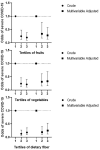Association of fruits, vegetables, and fiber intake with COVID-19 severity and symptoms in hospitalized patients: A cross-sectional study
- PMID: 36245547
- PMCID: PMC9557193
- DOI: 10.3389/fnut.2022.934568
Association of fruits, vegetables, and fiber intake with COVID-19 severity and symptoms in hospitalized patients: A cross-sectional study
Abstract
Background and aims: Fruits and vegetables are rich in fiber and a good source of anti-inflammatory and immune-boosting vitamins, minerals, and antioxidants. We investigated the association between fruits, vegetables, and fiber intake and severity of COVID-19 and related symptoms in hospitalized patients.
Methods: A total of 250 COVID-19 hospitalized patients aged 18 to 65 years were recruited for this cross-sectional study in Kashan, Iran, between June and September of 2021. Dietary intakes were assessed using an online validated 168-item food frequency questionnaire (FFQ). COVID-19 severity and symptoms were evaluated using the National Institutes of Health (NIH) COVID-19 Treatment Guidelines. Moreover, we examined COVID-19 symptoms, inflammatory biomarkers, and additional factors.
Results: The mean age of participants was 44.2 ± 12.1 years, and 46% had severe COVID-19. Patients with higher consumption of fruits (OR: 0.28; 95% CI: 0.14-0.58, P-trend <0.001), vegetables (OR: 0.33; 95% CI: 0.16-0.69, P-trend <0.001), and dietary fiber (OR: 0.25; 95% CI: 0.12-0.53, P-trend <0.001) had lower odds of having severe COVID-19. In addition, they had shorter hospitalization and convalescence periods, lower serum C-reactive protein (CRP), and a reduced risk of developing COVID-19 symptoms such as sore throat, nausea and vomiting, dyspnea, myalgia, cough, weakness, fever, and chills.
Conclusion: Higher consumption of fruits, vegetables, and fiber was inversely linked with COVID-19 severity, clinical symptoms, hospitalization and convalescence duration, and CRP concentrations. The results should be interpreted with caution in light of the limitations, and prospective cohort studies are required to further evaluate these findings.
Keywords: COVID-19; dietary fiber; fruits; infectious disease; severe disease; vegetables.
Copyright © 2022 Tadbir Vajargah, Zargarzadeh, Ebrahimzadeh, Mousavi, Mobasheran, Mokhtari, Rahban, Găman, Akhgarjand, Taghizadeh and Milajerdi.
Conflict of interest statement
The authors declare that the research was conducted in the absence of any commercial or financial relationships that could be construed as a potential conflict of interest.
Figures
Similar articles
-
The association between dietary intakes of zinc, vitamin C and COVID-19 severity and related symptoms: A cross-sectional study.Clin Nutr ESPEN. 2023 Jun;55:244-250. doi: 10.1016/j.clnesp.2023.03.013. Epub 2023 Mar 21. Clin Nutr ESPEN. 2023. PMID: 37202053 Free PMC article.
-
Higher Adherence to the Mediterranean Dietary Pattern Is Inversely Associated With Severity of COVID-19 and Related Symptoms: A Cross-Sectional Study.Front Med (Lausanne). 2022 Jul 19;9:911273. doi: 10.3389/fmed.2022.911273. eCollection 2022. Front Med (Lausanne). 2022. PMID: 35928288 Free PMC article.
-
Major dietary patterns in relation to disease severity, symptoms, and inflammatory markers in patients recovered from COVID-19.Front Nutr. 2022 Aug 22;9:929384. doi: 10.3389/fnut.2022.929384. eCollection 2022. Front Nutr. 2022. PMID: 36082030 Free PMC article.
-
Higher Intake of Dietary Magnesium Is Inversely Associated With COVID-19 Severity and Symptoms in Hospitalized Patients: A Cross-Sectional Study.Front Nutr. 2022 May 12;9:873162. doi: 10.3389/fnut.2022.873162. eCollection 2022. Front Nutr. 2022. PMID: 35634398 Free PMC article.
-
Fruits and Vegetables in the Management of Underlying Conditions for COVID-19 High-Risk Groups.Foods. 2021 Feb 10;10(2):389. doi: 10.3390/foods10020389. Foods. 2021. PMID: 33578926 Free PMC article. Review.
Cited by
-
The Intersection Between COVID-19, Cardiovascular Disease, and Diet: a Review.Curr Atheroscler Rep. 2023 Oct;25(10):643-652. doi: 10.1007/s11883-023-01138-7. Epub 2023 Aug 30. Curr Atheroscler Rep. 2023. PMID: 37646976 Review.
-
The Global Impact of COVID-19: Historical Development, Molecular Characterization, Drug Discovery and Future Directions.Clin Pathol. 2023 Dec 23;16:2632010X231218075. doi: 10.1177/2632010X231218075. eCollection 2023 Jan-Dec. Clin Pathol. 2023. PMID: 38144436 Free PMC article. Review.
-
Unhealthy Food Consumption Is Associated with Post-Acute Sequelae of COVID-19 in Brazilian Elderly People.Infect Dis Rep. 2025 Mar 13;17(2):25. doi: 10.3390/idr17020025. Infect Dis Rep. 2025. PMID: 40126331 Free PMC article.
-
Diet Quality and Risk of SARS-CoV-2 Infection or COVID-19: A Systematic Review of Observational Studies.Adv Nutr. 2023 Nov;14(6):1596-1616. doi: 10.1016/j.advnut.2023.09.006. Epub 2023 Sep 23. Adv Nutr. 2023. PMID: 37748553 Free PMC article.
-
Possible roles of phytochemicals with bioactive properties in the prevention of and recovery from COVID-19.Front Nutr. 2024 Jul 10;11:1408248. doi: 10.3389/fnut.2024.1408248. eCollection 2024. Front Nutr. 2024. PMID: 39050135 Free PMC article.
References
-
- Ghebreyesus TA. WHO Director-General's opening remarks at the media briefing on COVID-19. Geneva: World Health Organization. [2020].
LinkOut - more resources
Full Text Sources
Research Materials
Miscellaneous


